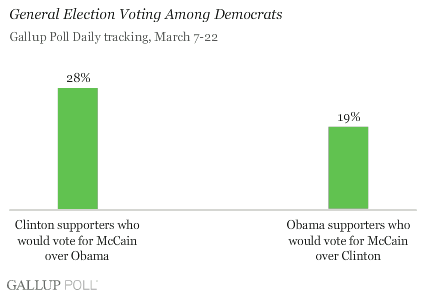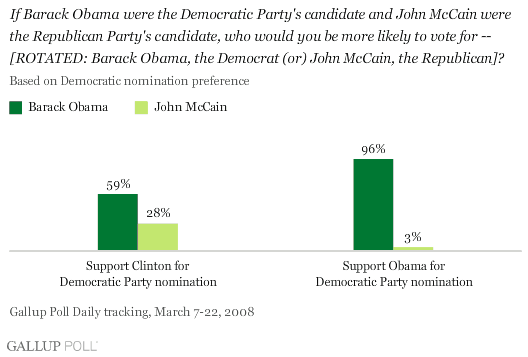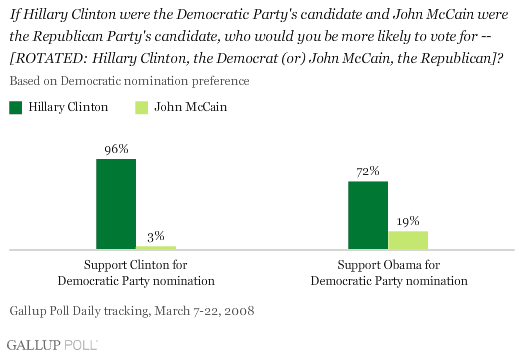PRINCETON, NJ -- A sizable proportion of Democrats would vote for John McCain next November if he is matched against the candidate they do not support for the Democratic nomination. This is particularly true for Hillary Clinton supporters, more than a quarter of whom currently say they would vote for McCain if Barack Obama is the Democratic nominee.

These conclusions are based on an analysis of Democratic voters' responses to separate voting questions in March 7-22 Gallup Poll Daily election tracking. In each day's survey, respondents are asked for their general election preferences in McCain-Clinton and McCain-Obama pairings. Democratic voters are then asked whom they support for their party's nomination.
The accompanying graph displays the results of the relationship between support for the Democratic Party's nomination and the general election vote between Obama and McCain.

As would be expected, almost all Democratic voters who say they support Obama for their party's nomination also say they would vote for him in a general election matchup against McCain. But only 59% of Democratic voters who support Clinton say they would vote for Obama against McCain, while 28% say they would vote for the Republican McCain. This suggests that some Clinton supporters are so strongly opposed to Obama (or so loyal to Clinton) that they would go so far as to vote for the "other" party's candidate next November if Obama is the Democratic nominee.
The results follow the same pattern, but not to quite the same extent, when the relationship between Democratic support and a general election matchup between Clinton and McCain is examined.

Here again, as expected, almost all of those who support Clinton for the Democratic Party's nomination say they would vote for her against McCain. Seventy-two percent of those who support Obama for the party's nomination would vote for Clinton against McCain, while 19% would desert and vote for the Republican.
Implications
The data suggest that the continuing and sometimes fractious Democratic nomination fight could have a negative impact for the Democratic Party in next November's election. A not insignificant percentage of both Obama and Clinton supporters currently say they would vote for McCain if he ends up running against the candidate they do not support.
Clinton supporters appear to be somewhat more reactive than Obama supporters. Twenty-eight percent of the former indicate that if Clinton is not the nominee -- and Obama is -- they would support McCain. That compares to 19% of Obama supporters who would support McCain if Obama is not the nominee -- and Clinton is.
It is unknown how many Democrats would actually carry through and vote for a Republican next fall if their preferred candidate does not become the Democratic nominee. The Democratic campaign is in the heat of battle at the moment, but by November, there will have been several months of attempts to build party unity around the eventual nominee -- and a focus on reasons why the Republican nominee needs to be defeated.
Additionally, some threat of deserting the party always takes place as party nomination battles are waged, and this threat can dissipate. For example, in answer to a recent Gallup question, 11% of Republicans said they would vote for the Democratic candidate or a third-party candidate next fall if McCain does not choose a vice president who is considerably more conservative than he is. (And another 9% said they just wouldn't vote.) These results suggest that it may be normal for some voters to claim early on in the process -- perhaps out of frustration -- that they will desert their party if certain things do not happen to their liking. And it may be equally likely that they fall back into line by the time of the general election. It is worth noting that in Gallup's historical final pre-election polls from 1992 to 2004, 10% or less of Republicans and Democrats typically vote for the other party's presidential candidate.
Still, when almost 3 out of 10 Clinton supporters say they would vote for McCain over Obama, it suggests that divisions are running deep within the Democratic Party. If the fight for the party's nomination were to continue until the Denver convention in late August, the Democratic Party could suffer some damage as it tries to regroup for the November general election.
Survey Methods
Results are based on telephone interviews with 6,657 national Democratic voters, aged 18 and older, conducted March 7-22, 2008. For results based on the total sample of national adults, one can say with 95% confidence that the maximum margin of sampling error is ±2 percentage points.
Interviews are conducted with respondents on land-line telephones (for respondents with a land-line telephone) and cellular phones (for respondents who are cell-phone only).
In addition to sampling error, question wording and practical difficulties in conducting surveys can introduce error or bias into the findings of public opinion polls.
